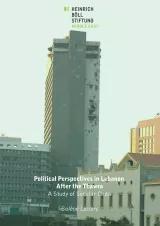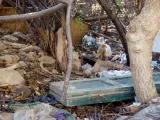Internships
The internship program of the Middle East Office of the Heinrich Böll Stiftung (hbs) welcomes interns who have a special interest in one or several hbs program areas. The internship program is a research internship that intends to provide an opportunity for students and young researchers to delve into a research field related to the hbs program areas, while getting hand-on practical experience in the field of international development work. The research is accompanied and supported by hbs colleagues and can be used as an opportunity for a student’s degree dissertation. Apart from pursuing their independent research, interns will learn about hbs activities and gain practical work and research experience. At the same time, interns are expected to contribute to hbs activities with their knowledge and ideas.
Highlights on creative projects / research papers by interns
Over the years, we received many interns that contributed tremendously to our work. They were all an asset to this office. Here is one of the inspiring creative projects and one of the research papers
How to Apply
IMPORTANT NOTE: Lebanon is an interesting but also a challenging environment. For reasons partly related to the volatile political situation, the Middle East Office internship program strongly encourages applicants to familiarize themselves with the challenges of an extended stay in such an environment prior to submitting an application. Applicants should highlight any previous experience in living in similarly challenging conditions.
Who would be the best candidate for an internship with the Heinrich Böll Stiftung?
Advanced students (third year bachelor degree onwards), a study focus and research interest in hbs program areas are ideal candidates. This includes students of political, social and environmental sciences, economics, law, media, cultural and area studies. Local and international students, as well as young researchers, including refugees, are highly encouraged to apply. Unfortunately, we cannot accommodate PhD students and internships that need to be accredited as part of law studies.
Applicants should propose a research activity or a creative project which they would like to pursue during the internship related to hbs’ programmatic focus areas. Our team will be happy to discuss proposed research ideas and projects, lend support through contacts and information, and potentially incorporate aspects of such a project into our program once your application has been accepted. Please note that applications without a research or project proposal will not be considered.
What types of documentation and information should be included in an application?
The application should consist of the following documents:
• Cover letter.
• Curriculum Vitae (maximum 2 pages)
• Research Proposal (maximum 2 pages, please download format here)
The cover letter should include summary background information on the applicant. More importantly, it must contain an explanation of the applicant’s motivation for an internship with hbs and it must highlight a proposal for a research activity/ project that the applicant aspires to undertake during the stay with hbs (see above). Please do not forget to specify the exact time of your availability.
The internship is for a minimum period of 3 months and up to 6 months.
The curriculum vitae should be updated and precise, providing an overview of the educational background, previous professional experience, social and political engagement and publications on a maximum of two pages.
When designing your proposal, please keep in mind that there are topics that have been dealt with extensively in academia, which might render it difficult to contribute anything significantly new within the framework of an internship. We therefore recommend to go for more manageable topics. In the end of their internship, the intern will publish a result of their research, which can be but is not limited to a research paper. Creative outputs are welcome.
Please consider research topics within the following fields and from the region (Lebanon, Syria, Iraq):
- Ecology and Sustainability: (food sovereignty, agro-ecology, resource management and governance, climate protection, energy, urban planning).
- Democratisation & Human Rights: (Minority rights, human rights, women rights, financial governance, party reform, youth participation, civic rights).
- Justice & Accountability: (Regional relations, peace and security, refugees and migration policies, relation with the EU, justice and Impunity).
Please make sure to send all your documents in English and that your resume is in accordance with international non-discrimination standards and does not contain a photo.
What benefits do we offer?
HBS offers interns to be part of an exciting and challenging work environment, and provides an opportunity to build a network of contacts with activists, development workers, and artists in Lebanon and the region. Interns will receive guidance and support during their research, and will be in a position to gain first-hand information on development, social and political issues from the hbs team and our partner organizations. Unfortunately no travel expenses can be covered. We do not organize for the accommodation of interns, but we will assist interns throughout their search.
When do you receive an answer?
Applications will be received all through the year; an acknowledgment of receiving the application will be emailed to the applicant and the application processed as soon as possible. Please note that we have a high number of applications.
How to Apply?
Send an email to info@lb.boell.org with the subject “application for internship”. Make sure to attach the cover letter, CV and project proposal in PDF format. Applications are not supposed to be directed to or address any particular person at hbs






















